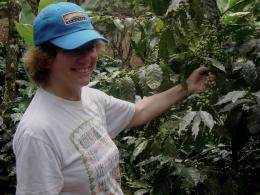Read the full text transcript (PDF) and listen to the full audio of the oral history with Robbie Jaffe.

- Robbie Jaffe at the coffee farm of Roberto Jimenez in Agua Buena, Costa Rica. Roberto Jimenez is a leader in CoopePueblos Cooperative, CAN's partner organization, and is host to many student interns. He has visited UCSC several times.
Roberta (Robbie) Jaffe grew up in New York in the 1950s, and moved to Florida when she was sixteen. She attended the University of Florida and University of South Florida, and graduated with a degree in sociology. During and after college she was deeply involved in the United Farm Workers (UFW) movement as a field organizer and boycott organizer for the state of Florida. Jaffe first came to the Santa Cruz area with her then-husband, Jerry Kay, who was also active in the sustainable agriculture movement. They farmed ten acres near Elkhorn Slough, and in 1976, Jaffe helped start the first farmers’ market in Santa Cruz County, at Live Oak School.
After that marriage ended, Jaffe studied horticulture at Cabrillo College with Richard Merrill, and took a position with a CETA (Comprehensive Employment and Training Act) program called Project Blossom. As part of that program, she co-founded a school garden at Green Acres School in Live Oak, a semi-rural area near Santa Cruz, California. This was the genesis of the Life Lab Science Program, which grew into a groundbreaking nonprofit organization that works with schools throughout the United States to develop school gardens and curriculum for teaching science and nutrition. Jaffe served as founding executive director of the program for many years.
Jaffe earned a second master’s degree in education from UC Santa Cruz, with an emphasis in agroecology. She met and married Steve Gliessman (also the subject of an oral history in this series). In 2001, they co-founded the Community Agroecology Network (CAN). CAN defines its goals as, “to help a network of rural, primarily coffee-growing communities in Mexico and Central America develop self-sufficiency and sustainable growing practices, and direct market coffee to consumers in the United States.”
Jaffe is the co-author of “From Differentiated Coffee Markets Towards Alternative Trade and Knowledge Networks,” in Confronting the Coffee Crisis: Sustaining Livelihoods and Ecosystems in Mexico and Central America, and many Life Lab publications, including The Growing Classroom.
Ellen Farmer interviewed Robbie Jaffe on May 5, 2007, at Jaffe's house in Santa Cruz, California. Farmer’s MA thesis (in public policy) at California State University at Monterey Bay focused on the coffee crisis. As a graduate student, she worked with Jaffe at CAN, and brought her knowledge of the economics and politics of coffee growing in Latin America to the interview.
Links:
- Life Lab Science Program: http://www.lifelab.org/
- Blog about Life Lab’s History: http://lifelabhistory.blogspot.com/2009/01/share-your-life-lab-story.html
- Community Agroecology Network: http://www.canunite.org/
- Condor’s Hope Winery: http://www.condorshope.com/
- Roberta Jaffe and Gary Appel, The Growing Classroom: Garden-Based Science and Nutrition Activity Guide (Revised Edition 2007) http://www.lifelab.org/store-curricula.html#tgc

 Santa Cruz, CA
Santa Cruz, CA



